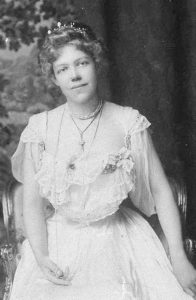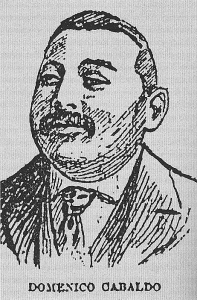By: Marianna Gatto, ISDA Contributing Editor
Maria Barbella was part of the Great Arrival of Italian immigrants to the United States. In 1892, Maria, age 22, and her family left their native Basilicata for New York City where they settled in Mulberry Bend, part of the infamous Five Points neighborhood of Lower Manhattan.
Barbella, like many of her contemporaries, went to work in the sweat industry, toiling for a pittance to help her family make ends meet.

Each day, as she walked to work, Barbella passed the shoeshine booth of Domenico Cataldo, a fellow immigrant from Basilicata who had become quite successful in America. Cataldo began wooing Barbella, persuading her to see him before returning home to the watchful eyes of her parents. When Barbella’s father learned of Cataldo’s overtures he forbade his daughter from having any contact with him, a directive that Barbella initially followed. But before long, Cataldo’s advances grew stronger. He convinced Barbella that he was in love with her and promised that as his wife, she would never have to sew in a factory. Barbella agreed to meet Cataldo at his home, where he pledged they would be married, but instead he drugged and sexually assaulted her.
Barbella, who had only been in the United States for one year and spoke little English, did not know to whom she should turn. She begged Cataldo to keep his promise of marrying her, but months passed, and Cataldo delivered only excuses. Cataldo was in fact already married; his wife and children were waiting for him in Italy.
“Le bugie hanno le gambe corte.” (Lies have short legs.)
-Italian proverb
When Cataldo’s charade had outlived its lifespan, he informed Barbella that the relationship was over and that he planned to return to Italy. Barbella grew incensed. Cataldo’s actions would ruin her; she would be unable to marry, would become a social outcast, and would likely be condemned to a life of poverty. In desperation, Barbella turned to her mother, who also pleaded with Cataldo to marry her daughter. Cataldo said that he would, if the family paid him $200 — a fortune for her impoverished parents.
On the day that Cataldo was to depart, Barbella found him in a saloon playing cards. She once again implored him to fulfill his promise, to which Cataldo responded, “Only a pig would marry you!” An enraged Barbella produced a straight razor and slashed her former suitor. While she had only intended to scare him and attract the attention of the police who Barbella believed would force Cataldo to fullfil his obligation, Cataldo was mortally wounded, and Barbella was promptly arrested and charged with murder.
Following a sensational trial filled with inept attorneys, a prejudiced judge, and inflammatory media coverage that portrayed her as a “degenerate” and reflected the era’s anti-Italian sentiments, Barbella was convicted by an all-male jury that did not include a single Italian American. Barbella became the first woman to be sentenced to death in the newly invented electric chair. While awaiting her execution, she was imprisoned at New York’s infamous Sing Sing where Barbella was the prison’s first female inmate and the only woman prisoner held at the facility. Barbella would have undoubtedly met a tragic fate had it not been for American-born Italian aristocrat and activist Cora Slocomb, who launched the nation’s first campaign against the death penalty.

Rallying the press, Slocomb bridged New York’s social divide, appealing equally to the Fifth Avenue elite and the impoverished masses of Little Italy. Barbella’s “crime of honor” became a cause celebre that captivated the nation.

To learn more about award-winning author and documentary filmmaker Idanna Pucci, whose book, The Lady of Sing Sing, chronicles this incredible case, please click here.
Marianna Gatto is the executive director and cofounder of the Italian American Museum of Los Angeles (IAMLA), a historian and author with more than a decade of experience in public history, non-profit leadership, museums, and education.




